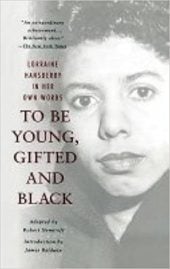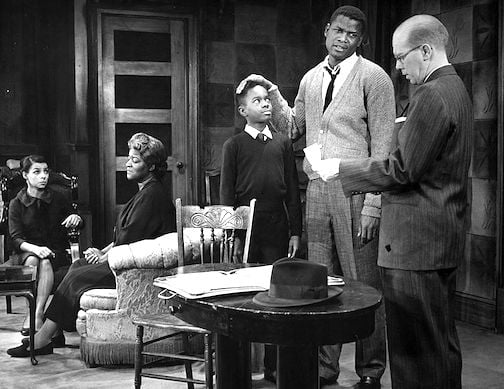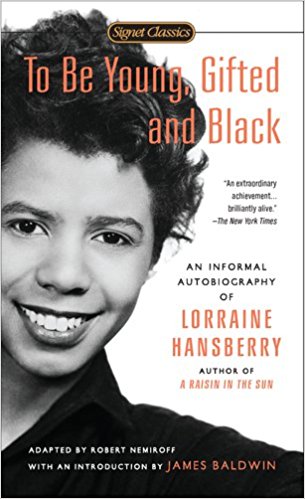To Be Young, Gifted and Black by Lorraine Hansberry (1969)
By Taylor Jasmine | On April 25, 2018 | Updated August 5, 2023 | Comments (0)

To Be Young, Gifted and Black: Lorraine Hansberry in her Own Words is a 1969 collection of autobiographical writings by the playwright and author best known for A Raisin in the Sun. The latter was the first play written by an African-American woman to be staged on Broadway.
Lorraine Hansberry‘s ex-husband and dear friend, the songwriter and poet Robert Nemiroff, became her literary executor after her death in 1965.
He gathered her unpublished writings and first adapted them into a stage play, To Be Young, Gifted and Black, which ran off Broadway from 1968 to 1969. The play was one of the most critically acclaimed and successful of that season and continues to be performed around the world.
In 1969, the collection of autobiographical writings by Hansberry that formed the basis of the play — letters, journals, and interviews — were gathered and published as a book of the same title. It’s unusual for a book to be adapted from a play, rather than the other way around, but this is how it transpired in this case, since the play had proven to be so successful.
To Be Young, Gifted and Black takes the reader from Hansberry’s early life in a Chicago ghetto, though her college days, and beyond into the creation of A Raisin in the Sun, which she wrote while still in her twenties.
Some of the writings touch on her marriage, her commitment to race and gender issues, and ends with her battle with terminal cancer. When she died, she was only thirty-four.
Anne Cheney, in the biography Lorraine Hansberry (1984), described the play that emerged from the book:
“To Be Young, Gifted and Black presents many facets and nuances of Black life — Black nationalism, cocktail parties, slavery, financial problems, family squabbles, humor, and universal concerns of man’s hopes and dreams.
At first the play creates a kaleidoscopic effect, as scenes rapidly shift from one intricate pattern to another, seemingly resulting in more chaos than order. But such chaos is necessary in causing us to confront the complexity, beauty, joy, and courage of Black life.”
This 1969 review of To Be Young, Gifted and Black presents a typically laudatory view of not only the book, but of the talented woman behind the words.
A 1969 review of To Be Young, Gifted and Black
Original review by Gordon Young of To Be Young, Gifted and Black: Lorraine Hansberry in Her Own Words, adapted by Robert Nemiroff (Fresno Bee, December 28, 1969): Lorraine Hansberry is best known for her play, A Raisin in the Sun, about a Southside Chicago Black family’s decision to move to a white suburb.
The play opened on Broadway in 1959 to critical acclaim and later was made into an award-winning movie starring Sidney Poitier. A second play, The Sign in Sidney Brustein’s Window, closed in 1965 on the day that Miss Hansberry died of cancer at age thirty-four.
A life and brilliant promise cut short
At the time of her death, Miss Hansberry was working on other dramas and had left behind a sizable body of reviews, letters, and speeches which form the basis of this book. Among her manuscripts was a play titled Les Blancs [produced on Broadway in 1970]. A second forthcoming volume will contain three shorter plays.
In addition, this book is an expansion of the script of a play by the same title which was staged in New York shortly before its publication and enjoyed a successful run. Clearly, Lorraine Hansberry deserves recognition for more than A Raisin in the Sun.
. . . . . . . . . .

Scene from A Raisin in the Sun, 1959
. . . . . . . . . .
Robert Nemiroff’s role
The task of marshaling that recognition has been taken up by her husband and literary executor, Robert Nemiroff, who adapted the material in this book. In the foreword he explains that he came across this undated note among her papers:
“If anything should happen — before ’tis done — may I trust that all commas and periods will be placed and someone will complete my thoughts.”
Nemiroff has placed the commas and periods with skill and taste. What emerges is a portrait of the artist as a young woman starting with a middle-class childhood in Chicago through two years at the University of Wisconsin and then on to Greenwich Village where, after the success of “Raisin,” and before her death, Miss Hansberry worked on her other writing and became increasingly associated with the civil rights movement of the early 1960s.
. . . . . . . . . .

To Be Young, Gifted and Black on Bookshop.org*
To Be Young, Gifted and Black on Amazon*
. . . . . . . . . .
An advocate for her race
Lorraine Hansberry was an eloquent spokesperson for her race. She didn’t attempt to disassociate herself from being Black. A well-meaning critic once described her as “a writer who happens to be a Negro.”
But Miss Hansberry scoffed at such comments since the characters in her plays reflected the crucial dilemma of being both inescapably Black while striving to attempt full status as human beings.
She was convinced that slavery had so eroded the dignity of African-American that no amount of white, liberal patronizing would ever effect a lasting improvement until Black people achieved their own renaissance.
Some of her more ideological essays and reviews are prophetic of what has developed as a separatist, militant movement.
The universality of Hansberry’s writing
Nevertheless, there remains a universality about much of her writing. There was no existential revelation that life contains the seeds of tragedy — she had known that all along.
On the other hand, her writing does not dips the cynicism and hopelessness so common in theater of her time. There is anger in her plays, but it is justified, specifically human, and directed not at hating but at affirming the ties that bind. Her style is compassionate, restrained, and finely honed, which makes it ever more impactful.
Early in her career, Miss Hansberry summarized her credo: “I wish to live because life has within it that which is good, that which is beautiful, and that which is love. Therefore, sine I have known all these things I have found them reason enough — and I wish to live.”
In the summer of 1964, Miss Hansberry wrote in her journal, “I think when I get my health back I shall go into the South to find out what kind of revolutionary I am.”
She never did, of course, but this book and her plays will make readers want to test the depth of their own commitment to the principles of humanism and understanding of which Lorraine Hansberry was such a brief but brilliant example.
. . . . . . . . . .

. . . . . . . . . .
More about To Be Young, Gifted and Black
- Reader discussion on Goodreads
- Wikipedia (play)
- Reader’s Guide at Random House
- To Be Young, Gifted and Black (1972 made-for-TV film)
. . . . . . . . . .
*These are Bookshop Affiliate and Amazon Affiliate links. If a product is purchased by linking through, Literary Ladies Guide receives a modest commission, which helps maintain our site and helps it to continue growing!
Leave a Reply